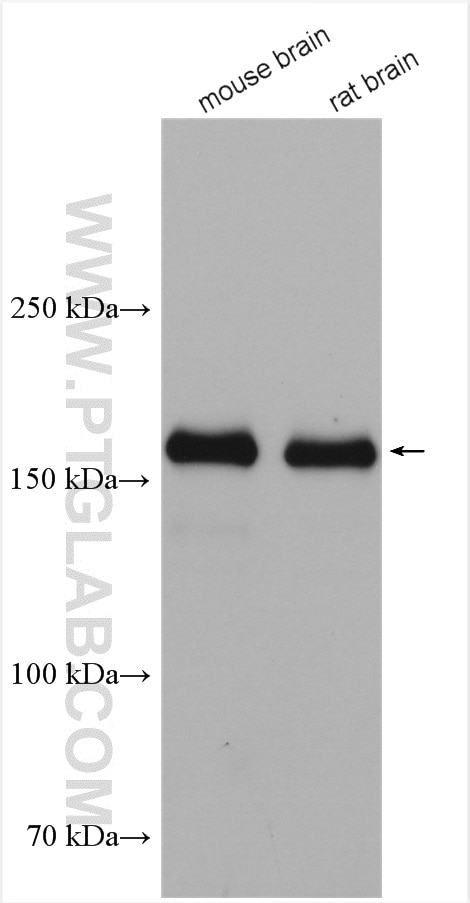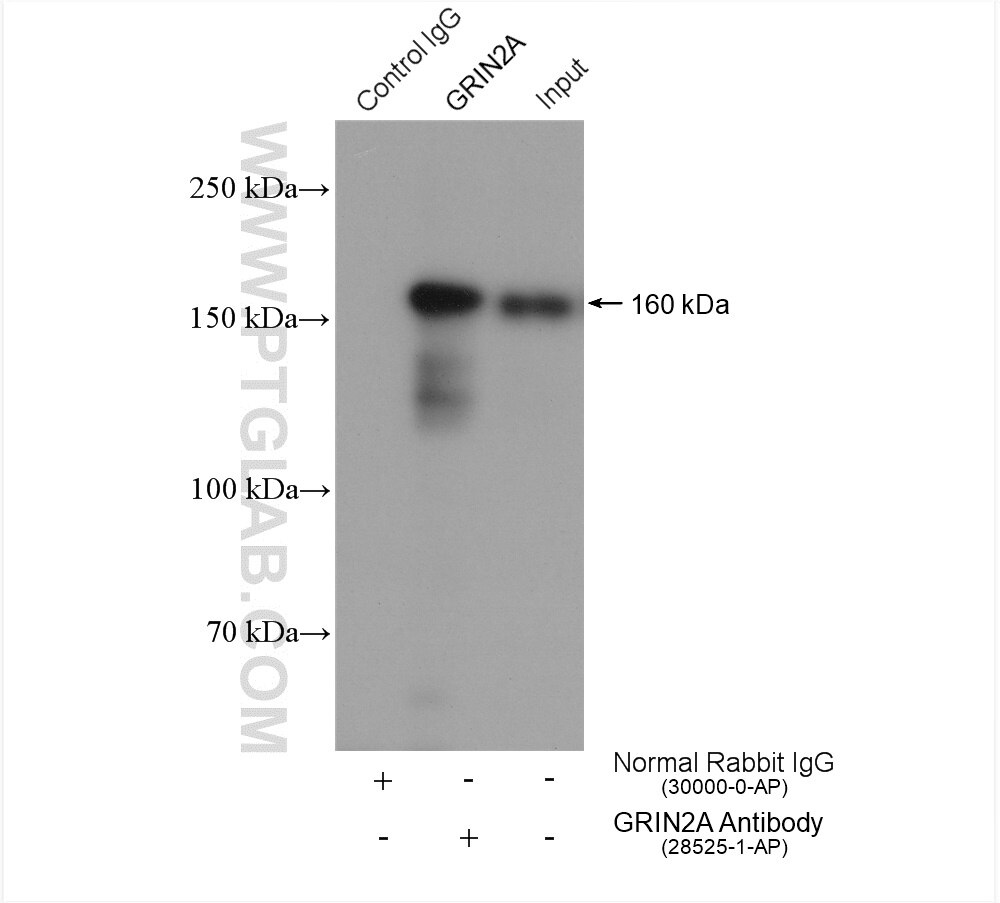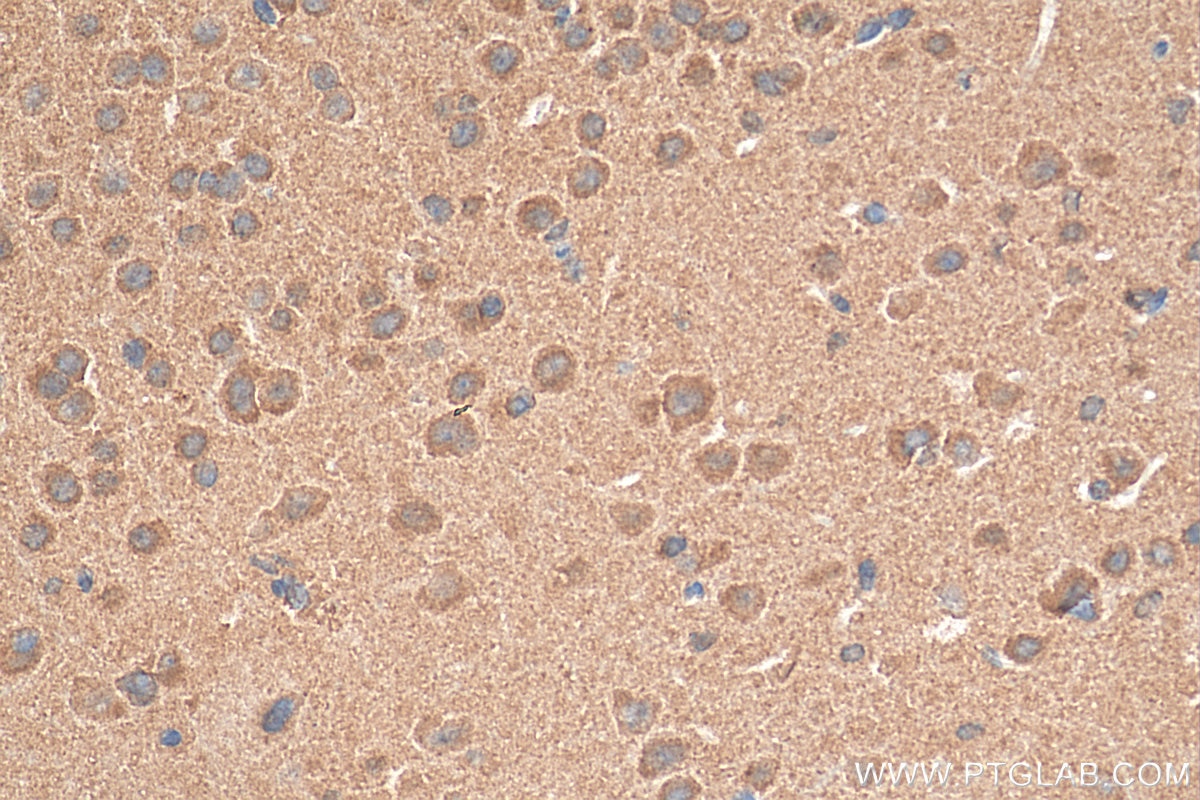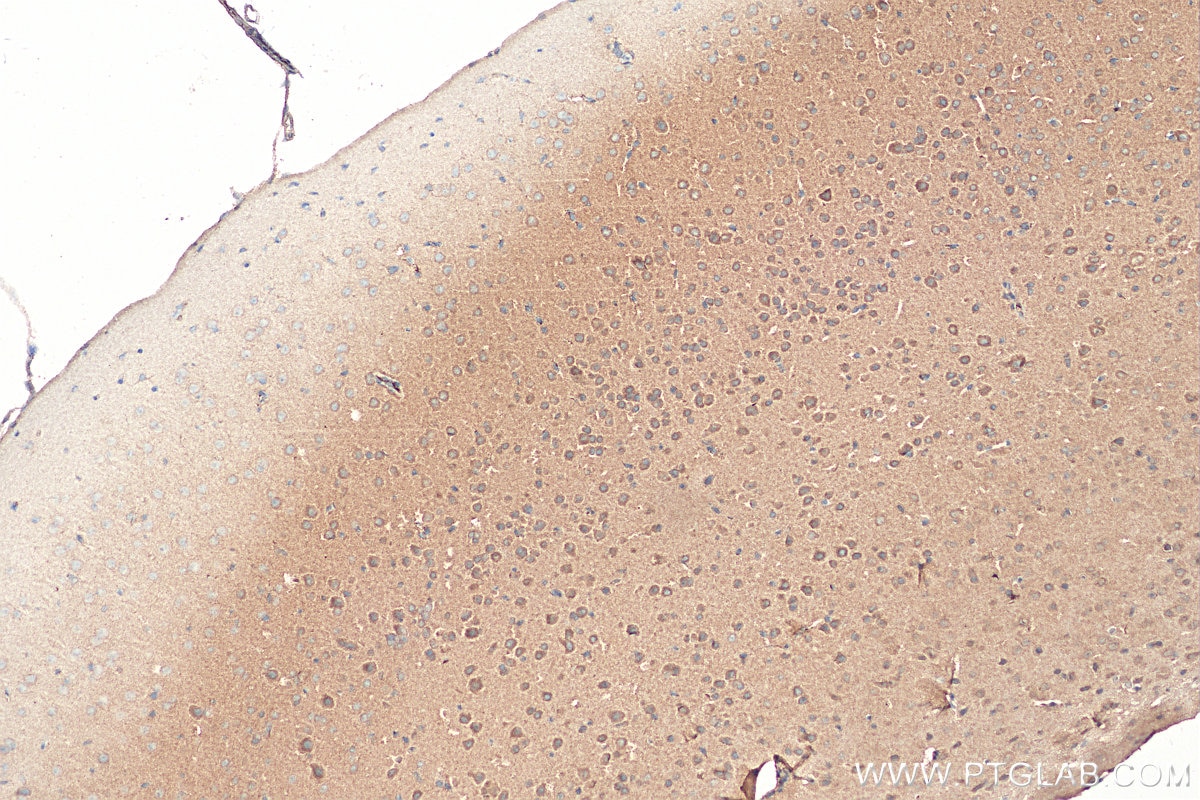NMDAR2A/GRIN2A Polyklonaler Antikörper
NMDAR2A/GRIN2A Polyklonal Antikörper für IHC, IP, WB, ELISA
Wirt / Isotyp
Kaninchen / IgG
Getestete Reaktivität
Maus, Ratte und mehr (1)
Anwendung
WB, IP, IHC, IF, ELISA
Konjugation
Unkonjugiert
Kat-Nr. : 28525-1-AP
Synonyme
Galerie der Validierungsdaten
Geprüfte Anwendungen
| Erfolgreiche Detektion in WB | Maushirngewebe, Rattenhirngewebe |
| Erfolgreiche IP | Rattenhirngewebe |
| Erfolgreiche Detektion in IHC | Maushirngewebe Hinweis: Antigendemaskierung mit TE-Puffer pH 9,0 empfohlen. (*) Wahlweise kann die Antigendemaskierung auch mit Citratpuffer pH 6,0 erfolgen. |
Empfohlene Verdünnung
| Anwendung | Verdünnung |
|---|---|
| Western Blot (WB) | WB : 1:1000-1:6000 |
| Immunpräzipitation (IP) | IP : 0.5-4.0 ug for 1.0-3.0 mg of total protein lysate |
| Immunhistochemie (IHC) | IHC : 1:50-1:500 |
| It is recommended that this reagent should be titrated in each testing system to obtain optimal results. | |
| Sample-dependent, check data in validation data gallery | |
Veröffentlichte Anwendungen
| WB | See 6 publications below |
| IF | See 1 publications below |
Produktinformation
28525-1-AP bindet in WB, IP, IHC, IF, ELISA NMDAR2A/GRIN2A und zeigt Reaktivität mit Maus, Ratten
| Getestete Reaktivität | Maus, Ratte |
| In Publikationen genannte Reaktivität | human, Maus, Ratte |
| Wirt / Isotyp | Kaninchen / IgG |
| Klonalität | Polyklonal |
| Typ | Antikörper |
| Immunogen | NMDAR2A/GRIN2A fusion protein Ag29101 |
| Vollständiger Name | glutamate receptor, ionotropic, N-methyl D-aspartate 2A |
| Berechnetes Molekulargewicht | 165 kDa |
| Beobachtetes Molekulargewicht | 160-180 kDa |
| GenBank-Zugangsnummer | NM_000833 |
| Gene symbol | GRIN2A |
| Gene ID (NCBI) | 2903 |
| Konjugation | Unkonjugiert |
| Form | Liquid |
| Reinigungsmethode | Antigen-Affinitätsreinigung |
| Lagerungspuffer | PBS mit 0.02% Natriumazid und 50% Glycerin pH 7.3. |
| Lagerungsbedingungen | Bei -20°C lagern. Nach dem Versand ein Jahr lang stabil Aliquotieren ist bei -20oC Lagerung nicht notwendig. 20ul Größen enthalten 0,1% BSA. |
Hintergrundinformationen
GRIN2A (glutamate ionotropic receptor NMDA type subunit 2A), also known as NMDAR2A. And its molecular weight is 165 kDa. GRIN2A is located in cell projection, dendritic spine, cell membrane, synapse, postsynaptic cell membrae, cytolamic vesicle membrane, which is expressed in many tissues, highest expression in brain and heart. This gene encodes a member of the glutamate-gated ion channel protein family. The encoded protein is an N-methyl-D-aspartate (NMDA) receptor subunit. NMDA receptors are both ligand-gated and voltage-dependent, and are involved in long-term potentiation, an activity-dependent increase in the efficiency of synaptic transmission thought to underlie certain kinds of memory and learning. These receptors are permeable to calcium ions, and activation results in a calcium influx into post-synaptic cells, which results in the activation of several signaling cascades. Disruption of this gene is associated with focal epilepsy and speech disorder with or without cognitive disability. Alternative splicing results in multiple transcript variants.
Protokolle
| Produktspezifische Protokolle | |
|---|---|
| WB protocol for NMDAR2A/GRIN2A antibody 28525-1-AP | Protokoll herunterladen |
| IHC protocol for NMDAR2A/GRIN2A antibody 28525-1-AP | Protokoll herunterladen |
| IP protocol for NMDAR2A/GRIN2A antibody 28525-1-AP | Protokoll herunterladen |
| Standard-Protokolle | |
|---|---|
| Klicken Sie hier, um unsere Standardprotokolle anzuzeigen |
Publikationen
| Species | Application | Title |
|---|---|---|
Adv Sci (Weinh) Single-Nucleus RNA Sequencing Reveals that Decorin Expression in the Amygdala Regulates Perineuronal Nets Expression and Fear Conditioning Response after Traumatic Brain Injury. | ||
Transl Psychiatry Reduction of p11 in dorsal raphe nucleus serotonergic neurons mediates depression-like behaviors | ||
J Affect Disord Dysregulation of striatal dopamine D2/D3 receptor-mediated by hypocretin induces depressive behaviors in rats | ||
Andrology Catch-up fat in male adults induces low testosterone and consequently promotes metabolic abnormalities and cognitive impairment. | ||
Psychiatry Res The role of reelin in the pathological mechanism of depression from clinical to rodents | ||
Front Pharmacol Characterization of three naturally occurring lignans, sesamol, sesamolin, and sesamin, as potent inhibitors of human cytochrome P450 46A1: Implications for treating excitatory neurotoxicity |





